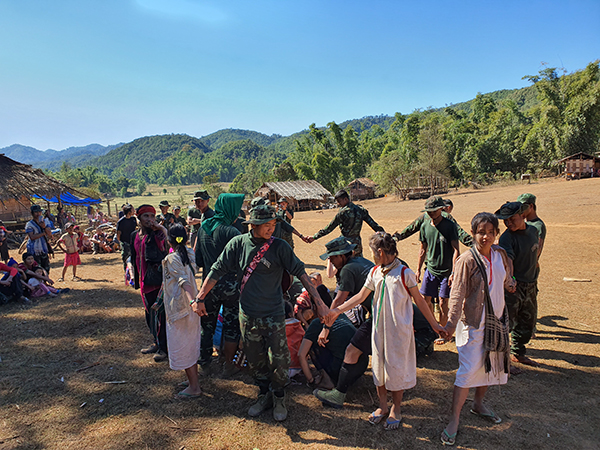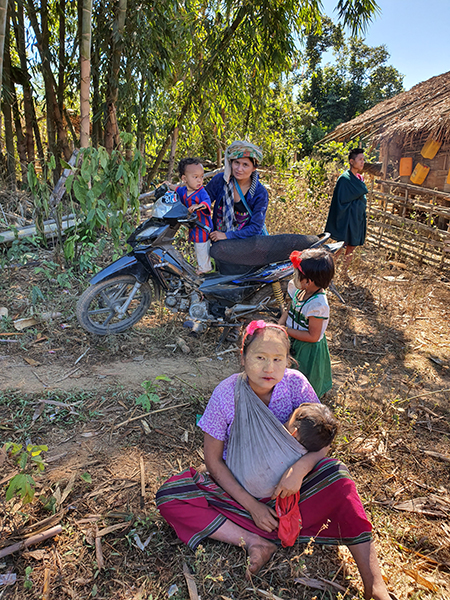Finding Pieces of Heaven in Karen State
8 March 2020
Karen State, Burma
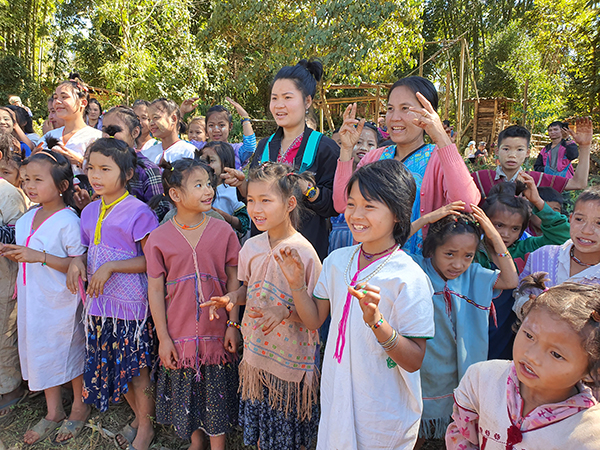
The thick old roots gnarled their way across the path as I stepped high to cross them. Mighty trees lined the ridge like sentinels, surveying the terraced rice fields below. Across the valley, a bald hill, punctuated with small huts and a fence, rose from the dense green jungle around it. From there, a different kind of sentinel surveyed the valley: Burma Army soldiers in their camp, projecting the threat of the regime onto the villagers below. This hilltop camp is connected to the valley by what seems to be only a path, barely wide enough for a vehicle, but is locally known as the “car road.” According to the seven-year-old “cease-fire” agreement, the Burma Army soldiers must stay on their hilltop – yet they have operated with impunity in the area for so long that only the most daring farmers attempt to farm this land, within mortar range of the camp and in reach of soldiers who have for decades looted, conscripted and destroyed in the lands of the Karen. Despite these shadows cast across the valley, the beauty of the ridge’s old forest and open expanse on either side beckons one to thank God for life in this moment.
This moment we are on a Free Burma Ranger and Good Life Club (GLC) mission, on our way to a village in Mu Traw District, Karen State, Burma. Dave directs the new FBR teams in reconning the Burma Army camp just over a mile away through binoculars and other high-powered lenses; they note details in equipment and personnel and get intel on recent activity from local villagers and security. This practical application of the training that started nearly four months ago follows the FBR tenets of putting a light on the situation by getting the news out, and leaving more faith, hope and love in the village than when you arrived.
Once in the village and into the GLC program, our team brings cultural education as Shan, Karenni, and Karen Rangers introduce themselves. The message to the families reminds them of strength in unity; to be discerning; and that God saves us out of destruction. Our Shan coordinator has the job of uniting new Rangers from two Shan factions that are even now in armed conflict and reminds the audience that Karen State has geography and social diversity that could also cause conflict. “Don’t fight each other,” is his message.
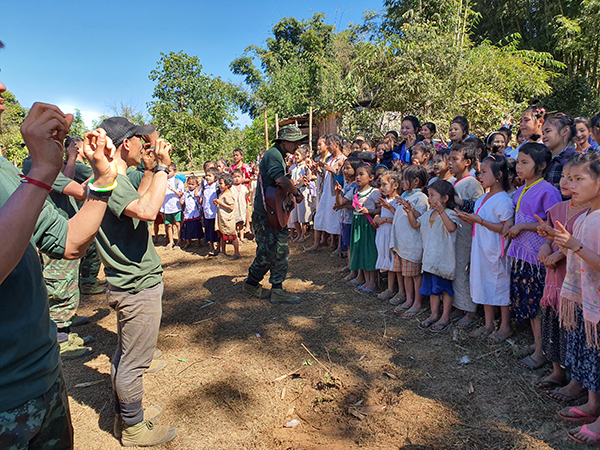
The Karen district leader reminds the villagers to read information given by the government carefully. They make many promises of development, but with any offer of development will come more control. “Do you want to be occupied and controlled by the camps who have held us under threat all our lives?”
The most pressing issue is a new road the government wants to build through these valleys. The road offers greater opportunities in trade and services, but the villagers here know it can also bring troops and heavy artillery in a fraction of the time it would take them to travel over rough footpaths. Last fall, in an unprecedented outcry against this occupation in the name of development, Karen villagers in a neighboring district staged a public protest complete with banners and media. Yesterday, teachers who brought their students to the GLC program answered my question about the current challenge to their schools with the same answer, “We don’t want the road from the government.” Another village demonstration coincided with a visit from our team and we were able to participate in their march, speeches, and praying for them as they raised their voices for the future they want to have with freedom.
At the same time, in this age of development, the Karen National Union (KNU) is not idle in their rural mountain areas. They are building their own roads with their own resources. The KNU roads dead-end a mile from the Burma Army camps to create a buffer between the villagers and camps. Even so, every kid’s program, clinic, and concert we held was within an hour walk of a different Burma Army camp. Each of our routes gave us views of another set of soldiers whose directives were unpredictable. Our last program, at Ler Mu Plaw, was with families who had to run away just a year ago, and where one environmental NGO leader was shot mid-day on a trail near his home. Hearing of new orders by the Burma Army that anyone carrying rice in a neighboring district will be shot on sight keeps villagers here apprehensive and anticipating fighting in their villages within a couple months.
Thankfully, the ceasefire holds for now and the sound of three distant explosions brought a cautious laugh from Doh Say, our GLC coordinator. “Not long ago, we would know those were three landmine accidents…now we’re glad it’s from the new tin mines just started this year.”
He told me that this valley had been one of the most fertile in the region, producing two crops of rice per year. Villages along this valley have a history of planting, running away, often before harvest, then re-cultivating the fields for production after regime attacks subside – not the most productive farming routine. Dave recounts about five of these cycles in the past 20 years of bringing relief teams to this area. Doh Say adds, “It’s been good farming here for about five years now and they’re even starting to add other crops of vegetables when the rice is harvested.” This area could actually be farmed and produce food for these communities year-round if they had the security.
Resiliency is an undeniable characteristic of the people here as they weather physical and political storms. The Rangers show the children a skit of Noah’s Ark. As unruly Rangers depict a drunken and destructive society, God is eagerly looking for someone, anyone, who loves Him and is daring enough to risk for a better future. Children come from the audience to help build the boat, and then more pretend to be animals that join Noah’s family in the vessel of salvation. The Ark lands in a new place on earth and the rainbow eternally illustrates the promise that God seeks and saves us from destruction, both of our own making and that caused by others. Every year brings opportunities to embrace change wisely.
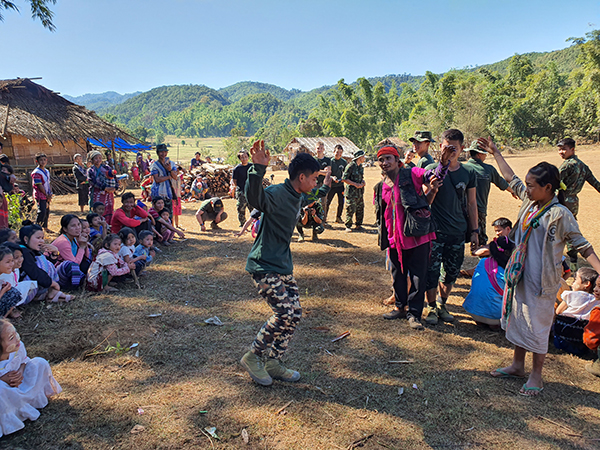
The teachers, despite coming from villages still without plumbing and electricity, asked us to help them buy printers and generators for their high schools. Even though our group still walks the 5-8 hours between villages on our route, more and more students are arriving to our programs on motorbikes and using their own cell phones to take selfies with us. The healthcare skit teaches to keep plastic trash out of rivers, a message timely for the repopulation of this valley. Once home to 4,000 people, then almost completely abandoned during the fighting, 3,000 have now returned to reclaim their lives.
The medics and dentist helped bring healing while, under the shade of bamboo, many high-school boys stopped by for a haircut from the Rangers who brought electric clippers. As a special treat this year, an American husband and wife team, professional Christian rap musicians, brought concert speakers and crazy, loving energy at evening concerts in Burmese, Karen, and English. The lyrics of one of their songs, “Miracle,” say, “We’re ships tossed by the storms of life, but we’re free tonight…chasing after life. Give me a glimpse of your world…show me a little piece of heaven.”
These Karen friends we meet and the Rangers from all over Burma have certainly been tossed on the storms of life. Yet, it seems never to have stopped them from looking for, and seeing, and seizing, the little pieces of heaven all around.
